This story describes the legacy of the Snow Valley Basketball School on coach development and the game of basketball.
(This article was originally published in four parts 11/30/18, 12/21/18, 1/15/19, and 2/15/19)
Chapter 1
A Passion for Teaching Fundamentals
Herb Livsey still operates in the shadows of basketball legends, canvassing the globe for basketball talent. For 21 years, Livsey has served as a scout in the National Basketball Association (NBA), a role often filled by the keenest of basketball lifers and hidden from the fast-paced, social media-driven limelight of NBA culture. But, out of the public eye, the 83-year old basketball savant has been shining a fatherly glow on the game of basketball and basketball coaches for more than 60 years.
As director of the famed Snow Valley Basketball School in California from 1961 to 2001, Coach Livsey advanced the basketball skills of thousands of young people in the United States and overseas. He connected with and nurtured the talents of hundreds of basketball coaches. Livsey’s contributions changed how the game of basketball is taught, perhaps making him the greatest developer of coaches in the history of the sport.
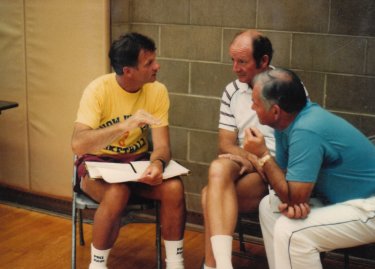
Herb Livsey (yellow shirt). Photo credit: Steve Middleton
Livsey’s story is one of passion, commitment, and making a difference. It all began in New Hampshire during the summer of 1956 and 57. Livsey was a 19-year old counselor at Camp Graylag, a traditional boys‘ summer camp. In 1952, Hall of Fame and NBA legend Bob Cousy became a partner in the camp and established a focus on basketball (Graylag Cabins, 2018). Unlike many summer camps, a basketball camp followed the conclusion of the traditional camp. Livsey fondly recollects a conversation with Cousy, “Bob called me into the office and said, ‘would you like to stay?’ I’m 19 and he says would you like to stay and coach one of the teams… I thought I had died and gone to heaven.” Cousy agreed to pay him twenty-five dollars.
Since Cousy’s camp was one of the few basketball camps in the country in the late 1950’s he needed to hire coaches to teach basketball skills. Cousy contacted two teachers of the game, former Boston Celtic teammates, Tommy Heinsohn and Bill Sharman. Both Sharman and Heinsohn would later be inducted into the Basketball Hall of Fame: Sharman as a player and a coach. Livsey reflects on the experience with a hint of awe. “Here I was, a 19-year old kid and I was on that staff and Bob gave me 16-year old kids and he watched over my shoulder, so I would be okay…I carried Bill Sharman’s bags from his car to his cabin and we were friends for the rest of our lives…Bob Cousy and Bill Sharman were my early influences. Bob with the camp and Bill with the coaching and fundamental play and being a solid player.”
The experience at Camp Graylag set the stage for Livsey’s future. His life was moving forward. He was engaged to be married and had been accepted to the graduate program at the University of Nevada-Reno. Before heading west, Livsey was impacted by Cousy’s parting words. “He (Cousy) said to me as I was leaving that summer…if you ever had a chance to own a camp, I have never had a young man love this environment more than you do.”
Newly married, the Livseys began a life together in Northern California. Having completed his graduate work, Herb was teaching and leading a high school team. Not long into the experience, he heard about a basketball camp being developed in Southern California, tucked in the San Bernardino Mountains. Although he originally only wanted to work the camp, he ended up buying 25% of the camp and a year later he bought out the other three owners. Thus in 1961 at the Snow Valley Ski Resort in Running Springs California, the Snow Valley Basketball School was born.
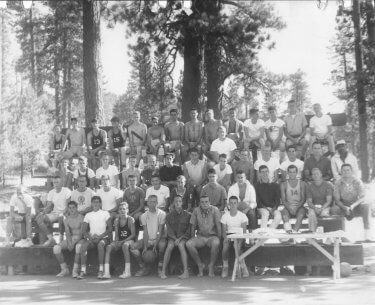
Camp photo 1961. Photo credit: Steve Middleton
A Day at Camp
Attending a Snow Valley Basketball camp as a player can be a life-altering experience. Basketball consumes the day, with three meals and a short slumber. A typical day at the camp begins when camp directors wake sleepy-eyed youth and push them towards the gym for a 5:45 AM session. Camp coaches await campers in the gym; the early risers sipping a cup of coffee, the night owls arriving just in time. The early session sets the tone for the day. Then campers fuel up with breakfast at 7:00 AM and return to the courts for a full day of instructional clinics. Morning clinics center on defense. As the day progresses, sessions shift to individual skill work with a focus on offense.
The philosophy at the Snow Valley Basketball School is teaching the fundamental skills of basketball. The schedule is designed to challenge youth to step out of their comfort zone. Replacing old routines with new habits. Each camper will have a team, but a minimal amount of time is set aside each day for team practices. There is only one game a day. Thus, the competition against one’s peers becomes a reward after a day of instruction. Campers and coaches share this sentiment. Drained after a day of instruction and physical activity, campers and coaches ignore lingering soreness and blistered feet. Fatigue, whether real or mentally self-imposed is placed aside. Suppressed competitive juices are released. This is the one moment they can let loose, practice new skills, or revert to old habits. The evening games, often running past midnight, hold some of the camp’s greatest stories.
Herb Livsey
The Snow Valley Basketball School weaved nicely into Livsey’s professional career as a teacher and coach. Livsey is an educator by trade, earning a B.A. in English, a B.S. in Physical Education from Florida Southern College and a master’s degree in both English and Physical Education from the University of Nevada-Reno. A high school teacher and coach during the 1960’s, Herb was hired at Orange Coast College (OCC) in 1969 and spent 27 years teaching English, the first seven years (1969-1976) he served as the head men’s basketball coach (Carnett, 2007).
Livsey held a variety of basketball coaching positions between 1977 and 1997 while teaching at OCC. After retiring in 1997, he became a scout for the Portland Trailblazers (1998-2004), Atlanta Hawks (2004-2008), and then the Denver Nuggets in 2008 – a position he still holds today (Lopez, 2014). In 1994, Livsey was inducted into the Southern California Interscholastic Basketball Coaches Association Hall of Fame and in 1998 into the California Community College Hall of Fame. The National Association of Basketball Coaches honored him for his service to the game at the 1990 NCAA Final Four.
Livsey’s passion for teaching and people drove him to create the Snow Valley Basketball School. He believed the camp had to be run a certain way with a hands-on approach. In the early years, Livsey would paint court lines on the parking lot surface, help build bleachers, and assist in the construction of backboards. His presence etched into every aspect of the camp from ensuring youth would not sneak out of their dorms at night, to early morning (2 AM) planning sessions preparing for the next day. Livsey assigned and organized coaches based on teaching ability and evaluated them to ensure learning was taking place.

Photo credit: MD Janiska (https://www.instagram.com/md_janiska/)
Legend has it that Herb was so intent on creating a peak learning environment he once told a young man working for the ski resort to silence his chainsaw because it was making too much noise and distracting the campers. Considering he was not his boss, the worker who was simply following orders to trim some trees on the ski slope was baffled by the insistence of Livsey’s words and demeanor. The interaction created some tension with the resort owners but demonstrated Livsey’s commitment to creating a culture of learning. It was a culture driven by Livsey’s passion and attention to detail and an approach he used in hiring coaches. He took pride in finding great teachers. Livsey’s goal was simple, hire the best teachers of the game and make Snow Valley the best fundamental basketball skill camp in the country.
Building his Vision
In the early 1970s, while attending a local high school game of a player he was recruiting, Livsey became impressed with the defense being orchestrated by the opposing coach, Clete Adelman. Soon after the game, Adelman remembers getting a phone call from Herb Livsey. “I had never met him, and he gets on the phone and was very direct and spoke quickly, ‘This is Herb Livsey, I want you to come and teach my basketball camp, Snow Valley Basketball School,’” recalls Adelman, “He said it fast and that was all he said.”
One of Livsey’s greatest recruits, Adelman starting working Snow Valley in 1973 and continued to work the camp for 41 years, moving into an administrator’s role in 1990 then part owner in 2002, until selling his ownership stake in 2014. A demanding and passionate coach, Adelman spent 27 years as the head coach at MiraCosta College (CA) and continues to value his role as a teacher of the game.
In seeking the best teachers of the game, Livsey recognized that the energy and passion of a young coach could be nurtured. If a coach wanted to be a good teacher – they could be. Thus, through relationships he had built over the years, coaching friends would recommend other coaches to him. Wayne Carlson worked his first Snow Valley camp based on a recommendation from the head coach he worked under at San Diego Mesa College (CA), who was friends with Livsey. Due to the connection, Livsey took a chance on Carlson and hired him in 1975. For the next 41 years, Wayne became an important part of the administrative team, becoming a director in 1984, and eventually part owner from 2001 to 2016. A career educator, Carlson spent 30 years as a U.S. History teacher and basketball coach at El Dorado High School in Southern California. He was inducted into the Southern California Interscholastic Basketball Coaches Association (SCIBCA) Hall of Fame in 2016.
Under Livsey’s vision – Snow Valley started building a reputation as a place where coaches could learn what to teach and how to teach it. In addition, a coach could build a vast network of colleagues who valued teaching the fundamentals of basketball. Coaches would clamor to be a part of the Snow Valley experience. In the early 1980s, Steve Middleton was working as a college assistant coach and called Livsey to inquire about working at the camp. Middleton recalls Livsey sharing he only hires coaches he has seen teach. Unfazed, Middleton was patient. A couple of years later, he moved into a new role as a high school varsity head coach in the same league as Wayne Carlson. Because Wayne was already established with Snow Valley, Herb attended a game. Livsey observed Steve as a coach and hired him in the summer of 1985. Middleton worked every summer until 2016, along the way becoming an administrator and eventually part-owner.
Everybody knew that Snow Valley was Herb’s passion. But as the camp grew, he placed more and more trust in those that worked with him. Carlson, Adelman, and Middleton are examples of coaches who started working the camp then eventually became directors and later part owners.
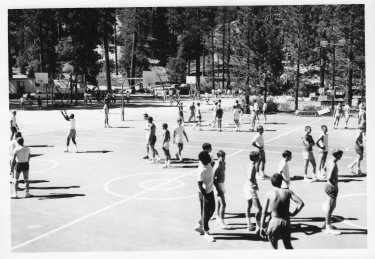
Snow Valley Basketball Camp, Snow Valley Ski Resort (CA). Photo credit: Steve Middleton
Wooden’s Impact on Basketball Camps
Throughout the 1960s and the early ’70s, college basketball was dominated by the UCLA Bruins and their head coach, Hall of Fame and basketball legend John Wooden. The Bruins captured ten national championships from 1964 to 1975, including seven in a row. The team broke numerous records and Wooden received a variety of coaching accolades (Davis, 2014).
Towards the end of his coaching career and well into his retirement years, Wooden’s influence extended into summer basketball camps. From 1971 to the early 1990s, The John Wooden Basketball Camp was a top-notch instructional camp that attracted some of the best coaches in the country. His success at UCLA bestowed upon him an awe-like quality, but it was his persona that endeared him to many. Wooden, a teacher of life demonstrated his values through his actions and the words he spoke. Coaches went to great lengths to work Wooden’s camps, to absorb his teachings and bask in his greatness. At camp, Wooden was able to share his passion for teaching the game with coaches (Hayes, 2015).
Snow Valley had been operating for over 10 years when the Wooden camps began. According to camp legend, Wooden was curious about the basketball being taught at a ski resort in the San Bernardino mountains. In the late 1960s, he arranged to meet with Herb and visit. Whether Wooden ever implemented any of the concepts he learned from Herb, is likely lost in time. Nonetheless, if Snow Valley influenced the great John Wooden, no one would be surprised. Wooden was well-known for being a life-long learner and felt every person could teach you something (Davis, 2014).
As the attractiveness of Wooden’s camps grew, Livsey would find it difficult to overcome Wooden’s popularity. That coupled with the fact Wooden’s camps were indoors, likely shifted the competitive balance for participants in Wooden’s favor. Livsey realizing his days of running an outdoor-only camp were shrinking, began to canvass Southern California for someone to host the camp. He finally convinced a small Christian liberal arts college in Santa Barbara about the potential financial gain of hosting a summer camp. Although hesitant at the thought of having a non-religious affiliated group on campus, administrators at Westmont College eventually agreed. Leaving the backdrop of idle chair lifts, snowless ski slopes, and the hum of a chainsaw behind, the Snow Valley Basketball School relocated to Westmont College in 1971 – where it still operates each summer.
While Wooden and Livsey shared a hunger for teaching the fundamentals of the game, Livsey was relatively unknown outside coaching circles and he would never match Wooden’s ability to inspire others simply with his presence. But what he did have was a vision to create the best basketball teaching camp in the country. To do so, he would hire only the best teachers, evaluate them on their passion and teaching ability, and then work the kids on fundamentals all day long.
Both men’s contributions to the game are celebrated and their impact on the growth of coaches well-known. Wooden enthused hundreds of coaches to strive for a higher standard in how they taught the game and went about life. Livsey created a structure within the Snow Valley camps that challenged coaches to step up and reach beyond the comforts of what they already knew – making them better teachers of the game and stewards of the coaching profession.
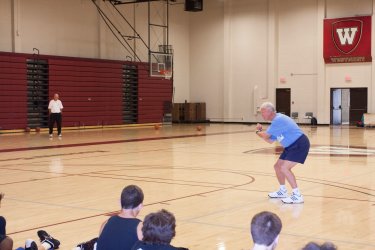
Herb Livsey teaching shooting. Photo credit: Steve Middleton
An optimal learning environment for coaches was blossoming at the Snow Valley Basketball School and coaches coveted to be a part of it. As knowledge of Snow Valley’s learning environment built on the teaching of fundamentals grew, so did the number of campers. At its peak, Snow Valley was running four consecutive weeks of camp with over 300 kids each week from all over the country and the world. To meet the demand, Herb would hire 40 to 50 coaches to work each week, always maintaining a ratio of eight players to one coach.
References
Carnett, J. (2007, November 8). Herb Livsey: Lugubrious, longsuffering loser; or luminescent, lionhearted leader? Orange Coast College. Retrieved from: http://www.orangecoastcollege.edu/news/Lists/Posts/Post.aspx?ID=6445
Davis, S. (2014). Wooden: A coach’s life. New York: Times Books.
Graylag (2018). Graylag history. Retrieved from: http://www.graylagcabins.com/history/
Hayes, G. (2015). Camp with Coach Wooden: The untold story of coach’s legacy after the UCLA years. Santa Clarita, CA: Greg Hayes.
Lopez, A. (2014). Longtime scout Herb Livsey a key part of Nuggets’ draft preparation. NBA Media Ventures, LLC. Retrieved from: https://www.nba.com/nuggets/longtime-scout-herb-livsey-key-part-nuggets-draft-preparation
Chapter 2
If the Coach is Learning the Athletes are Improving
Charlie Sands fled to a corner of the gym, trapped as the pressure of over 300 young athletes pushed against him. The hall of fame coach from West Los Angeles College had ignited the group during a final warm-up session. His spirited approach was creating a frenzied atmosphere. A fitness fanatic, Coach Sands became a legend at Snow Valley for his ability to motivate and inspire young people to come together as a group. This particular warm-up session was an accumulation of all the activities he’d led during the past week.
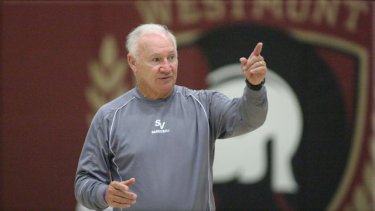
Charlie Sands. Photo credit: US Sports Camps
“You would not believe how electric the atmosphere in the gym was,” recalled Clete Adelman, “He (Charlie) would be out in front of 300 kids and anything he tell them to do, he would do. I mean jump stops, jumping in the air, diving on the floor… everything they did the whole week.” As Adelman reflects, “The kids are going crazy. Charlie is out there doing all this stuff. He is sweating like a sinner in church. I mean he is dripping wet. It was so emotional. So powerful.”
Charlie Sand’s relentless energy coupled with his ability to teach, led Herb Livsey to hire him in 1974. Sands would spend 42 years at Snow Valley eventually serving as part-owner. He would become a key partner in promoting Livsey’s vision to run a top instructional basketball camp, along the way helping coaches become better teachers.
The Snow Valley Way
The eyes of the young athlete focus intently on the coach: The lead clinician’s authority established. Now in the spotlight, with their teaching approach exposed for critical review, the lead clinician goes to work. Campers listen as the skill is introduced. Basket coaches shift closer to understand their role. Some are taking notes. The lead presents a detailed explanation of the skill, explains the drill, and then disperses the group to a series of baskets. The basket coaches run the drill and provide feedback as the athletes practice the skill. The campers, organized by age groups are accustomed to this teaching style. This is the Snow Valley Way.
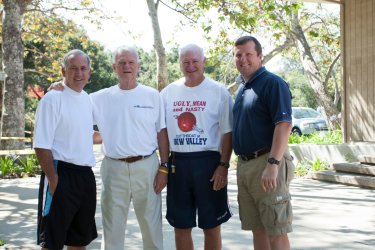
Carlson, Livsey, Sands, Middleton. Photo credit: Steve Middleton
Campers like the Snow Valley Way because they see their skills improve. Coaches like it too because they are learning new ways to teach skills. Wayne Carlson observed hundreds of instructional clinics over the years at Snow Valley. “While you watched the coaches teach you sat there and took notes. Then you would go out there and do the drills or the clinic, come back and write down more notes,” shared Wayne. “So not only were you taking notes on things you wanted to use in your own program, you would see the drill and then get to practice teaching it.”
Livsey structured the clinics to teach skill progression. Instructional clinics were repeated throughout the day during the entire week of camp. To lead an instructional clinic was an honor. A moment to shine. An opportunity to rise to the challenge. Livsey would carefully select and assign coaches to be lead clinicians and determine which coaches might work best as a basket coach for that particular clinic. A coach working the camp may serve as a basket coach for one clinic and a lead clinician in another session. It created a setting for coaches to practice and reflect on their craft.
Becoming a Better Coach
To work at Snow Valley was a commitment to becoming a better coach. Beyond the long 16 plus hour days, a coach was immersed in a culture where the development of the coach was almost as important as teaching basketball fundamentals. Livsey wanted Snow Valley to be a learning environment for coaches. Often, Livsey would assign an established coach to a dorm room with an up-and-coming coach. He knew that the younger coach’s enthusiasm would generate discussion and allow the veteran coach to share his wisdom. It was an exchange that benefited both parties.
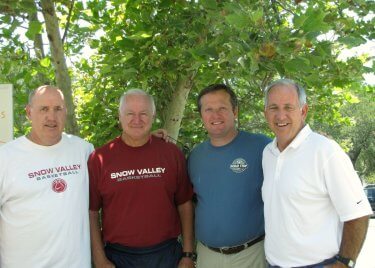 Adelman, Sands, Middleton, Carlson. Photo credit: Steve Middleton
Adelman, Sands, Middleton, Carlson. Photo credit: Steve Middleton
“The first year I was at Snow Valley I was a fired up young guy in my early 30’s and I roomed with Al Burger,” Adelman recalls, fondly reflecting on the memory. “Because I was rooming with him, I followed him around like a puppy dog.”
Al Burger was a long-time high school coach and well-known among the Snow Valley coaching fraternity. An inquisitive coach always seeking new coaching tips, Burger left an impression on the young Adelman. “He had this 31-page laminated notebook of people that taught the passing game. He would go around and ask people the same questions about the passing game,” recalls Adelman. “It started hitting me that here was a guy that could teach the game and he could still learn from others if they had a phrase, a term, or a drill that was going to help him.” Adelman’s experience in learning to coach was echoed by many camp coaches over the years.
Sixteen-year camp veteran Pete Gaskill, a Director and Lead Instructor for Genesis’ Elevate Basketball Academy in Kansas City, remembers being in awe his first year, “I’m a 22-year-old kid – thinking what am I doing here? My experience was significant in terms of gaining a better understanding of the game. But most importantly how to communicate it and how to teach it,” said Gaskill. “Everything I do seems to come back to Snow Valley.”
Wayne Carlson passionately looks back on the experience, describing the impact it had on his teaching in the classroom. “You take those teaching lessons not only from the basketball court, but into your history class,” says Carlson. “You’d watch them (coaches) and how they taught, how they worked with a group of kids, how they understood if learning was taking place and if learning was not taking place. Then how they would re-teach it.”
Due to the camp’s organization structure and because coaches spent so much time together, coaches began to see Snow Valley as a week-long coaching clinic. In his role as camp administrator, Steve Middleton began to notice the reason coaches worked Snow Valley, “It was not because we paid them a lot of money,” Middleton recalls, “It was because they could come for a week and immerse themselves with people who had a passion for the game. You could sit and hammer out X’s and O’s with some of the best coaching minds in the business.”
The unstructured clinics began in the dormitory’s common area: Often a bleak space adorned with a few well-worn chairs and possibly a table or two. If lucky, coaches would salvage an old blackboard from somewhere in the building. But what the setting lacked in atmosphere, did not diminish the enthusiasm among the coaches. Ideas flowed freely. Questions flourished.
Livsey remembers coming upon coaches conversing about games after a long day of camp. Coaches had a lot to share. Some like Mark Grabow could hold a room. Grabow, a long-time player development specialist, spent 23 years as Director of Athletic Development with the Golden State Warriors. His book, Mark Grabow’s On-Court 100, features over 100 drills to develop basketball skills and conditioning. “He held clinics in the living room of the coaches’ dorm,” remembers Livsey. “He would start at 8:00 and go into the wee hours of the morning, as long as the coaches wanted to stay.” Coach Grabow’s sessions were one of many informal clinics that left a mark on Snow Valley and Livsey, eventually leading to advancements in the teaching of basketball skills.
The manner in which the Snow Valley Basketball School was structured, from the instructional clinics to informal conversations, provided a framework for coaches to develop. For the coach it was more than a matter of seizing the opportunity to learn; Livsey established a higher standard – pushing coaches to be better.
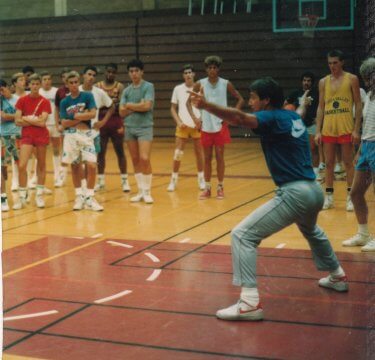
Tim Grgurich instructing the defense. Photo credit: Steve Middleton
“Herb Alert”
Livsey monitored all aspects of the camp, especially when it came to the quality of the teaching. He never wanted to sacrifice the teaching of basketball fundamentals. Livsey frequently observed the activity of the coaches, constantly evaluating their passion, willingness to learn, and ability to teach. Not every coach would make it through the week. Occasionally some would quit or he would send them packing. If you were not there to work, learn, and teach the game, Snow Valley was not the place for you and you did not survive.
When Snow Valley moved to Westmont College in 1971, Livsey finally had his indoor facility. But he never intended to abandon outdoor instruction. In order to accommodate the camp during the summer months, Westmont College Plant and Facilities personnel would convert the parking lots into basketball courts. As the number of campers grew, much of the camp remained outdoors on many of the parking lots scattered across campus.
It was during the instructional clinics, where Livsey and fellow camp directors would roam the different locations and observe coaches teaching. Steve Middleton remembers the first year he moved into an administrative role with the camp, “I opened up (the office), listened to a few voicemails and then was sitting in the office. He (Herb) walks in and says, ‘What are you doing? – get out there and watch some guys teach – take notes – see what they are doing – let them know what you think they did well – learn something,’” recalls Steve. “He gave coaches flexibility – but he wanted to make sure the kids were learning.”
Because Livsey’s drive and intensity were so strong, coaches were often intimidated by his presence. According to camp legend, Coach Livsey could intimidate with his stare. “If a coach was working a basket, he would walk up, stand there, and just stare. It scared the hell out of guys because they did not know what to think,” remembers Adelman. So much so, that they coined the term, “Herb Alert.” After a couple of long days at camp, a coach might struggle to resist the urge to find a shade tree or sit in a chair while the lead clinician was talking. A coach would say, “Herb alert” if they saw Livsey walking towards the courts they were working at. Once they knew Livsey was near they would straighten up.
Camp stories recall that Herb hid in the bushes to evaluate coaches. No video evidence can confirm this rumor, but coaches argue it’s true. In fairness, whether Livsey hid in the bushes or not, his intentions were pure. He was likely not trying to catch a coach slacking but ensuring that coaches teaching the clinics were doing it the way he wanted it done. Livsey’s intensity in running the camp was unparalleled. Snow Valley meant so much to him and it had to be run a certain way. Coaches working the camp understood this, but this did not mean they necessarily felt comfortable. Thus, the “Herb Alert” phrase became not only a warning, but a shared experience among the coaches – strengthening their bond and becoming a part of the Snow Valley experience.

Photo credit: MD Janiska (https://www.instagram.com/md_janiska/)
The Coach’s Experience
Aaron Christian by all measures was a veteran on the summer basketball camp circuit. By the time he worked a Snow Valley camp in the summer of 2001, he had worked hundreds of basketball camps all over the country. But he had heard stories about Snow Valley – he knew it was different. “I remember being scared…(thinking) I can’t mess up, I can’t mess up,” recalled Christian, laughing at the memory. “Herb played a big role in that. Him and Charlie Sands. They did not put up with anything. You didn’t want to upset them, and you didn’t want to let them down.”
Commitment, hard work, and confidence were all likely traits shared among the coaches since most of them were either recruited to work the camp or recommended by a former Snow Valley coach. Nonetheless, these qualities did not calm Aaron’s nerves that first week he worked camp. He simply wanted to do a good job and fit in. Early in the week, Livsey approached him. Aaron still remembers the conversation going something like this:
“I need you to do something for me today, Aaron,” pipes Herb in a very direct and blunt manner.
Aaron responded, “Sure, Herb, what do you need?”
Livsey continues, “I need you to teach one of the shooting sessions this afternoon. One of the lead instructors had a home emergency and we need you to do it.”
“Sure,” Aaron said, completely caught off guard.
“Immediately I am going oh crap – oh crap – why are you picking me,” recalls Aaron? “But I remember at lunchtime going into my room and mapping this whole thing out. How am I going to teach this? I don’t want to screw this up.” After the clinic was over, Aaron reminisces about his interaction with Livsey.
“Livsey says to me, ‘Nice job!’ I thank him with a bit of hesitancy,” says Aaron. “He was slightly taken aback and comments, ‘You seem relieved?’ I followed with, well that was kind of daunting to let the new guy do that. He just said, ‘I wasn’t worried.’”
As a young coach in the 1970’s, Wayne Carlson still remembers officiating a game at midnight. One of the coach’s responsibilities at Snow Valley was to officiate the evening game if they were not coaching. The game was between juniors and seniors, otherwise known as the Western Division. It also featured Don Meyer and Rick Majerus, two basketball coaches that would go on to national fame and make a lasting impact on the sport.
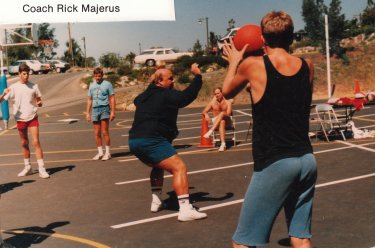
Rick Majerus Photo credit: Steve Middleton
Carlson still seemed in awe when sharing the moment, “Here I am 25 years old and I am reffing a midnight game at Westmont College. I’ve got Rick Majerus coaching one team and Don Meyer coaching the other team, and these guys are chewing my butt. Make this call! Make that call! I was young at the time and I could run up and down the floor. I was busting my butt to do a good job!”
The camp wore coaches out. Not just physically from too many hours standing on the unforgiving surface of a concrete slab or hard maple floor, but mentally – the constant pressure to perform at a high level. To complete a week of camp was an accomplishment. A moment celebrated among the staff.
Learning to become a better teacher of the game, instilled confidence in the coaches working Snow Valley. The Snow Valley coaching experience validated what they knew, exposed them to new methods, and challenged them to reflect on what it meant to be a coach. When a coach evaluated their experience after working at a camp, most of the reflection came from self-assessment – internal feedback. To truly know you had done a good job came later, well after the week had ended when you were asked to come back the following year.
To Be Asked Back…
During each day of camp, in addition to the instructional clinics coaches had one practice with their team. This was an opportunity to implement skills the campers had been learning into team concepts. During the practice session, coaches connected with their players and gave detailed feedback. To ensure each boy or girl who attended the camp received similar feedback, Livsey implemented a report card. Each coach was required to deliver a formal evaluation of the young player’s skills by the end of camp. Over the years the report card evolved and developed to match the changes and improvements in how skills were being taught.
While participants in the camp received prescribed feedback on their performance, there was no formal assessment of coaches. At the end of camp, Livsey would sit down with the camp directors and they would evaluate the staff. Which coaches did a good job? Who should they invite back? To coach at Snow Valley, you needed to be able to demonstrate three attributes: One, energy stemming from a passion for the game; two, a willingness to learn by improving your skills as a teacher; and three, the ability to teach. A coach demonstrating the three characteristics was likely asked back the following year. The skill to teach was paramount to the success of the camp, but Herb understood that coaches were still learning. Thus, Livsey knew he needed to have a balance of experienced and young coaches. He believed that each coach brought a unique skill set and personal experiences to the camp and that you could learn something from everyone.
Not unexpectedly, coaches bonded after working closely together over several days. But there was also something special about working a Snow Valley camp that united coaches. Was it the long hours together? The learning environment created by the instructional clinics? Or did it go beyond that? How the game of basketball was being taught was changing and more than ever, making connections with other coaches mattered.
Chapter 3
A Game is Changed
In a hurry, Herb Livsey drove towards Rancho Santa Fe, California. The opportunity to secure a well-known teacher of basketball within his grasp. Pete Newell’s grandson had just enrolled in the Snow Valley Basketball School. Enshrined in the Naismith Memorial Basketball Hall of Fame, Coach Newell is one of only three coaches to win the National Invitation Tournament (NIT), an NCAA championship, and an Olympic Gold Medal (The Naismith Memorial…, 2018). In 1987, The Atlanta Tip-Off club awarded him the Naismith Outstanding Contributor to Men’s Basketball Award (Citizen Naismith Trophy, 2018).
Livsey had known Coach Newell for a number of years. “One of my goals was to get Pete Newell to come and teach defense at Snow Valley,” recalls Livsey, “… because he (Newell) is a defensive guru.” Livsey seized the moment. He arrived at Pete Newell’s house and recalls the following exchange.
“Pete, how would you like to coach your grandson,” asks Herb?
“How can I do that,” responds Newell?
“He just enrolled at the Snow Valley basketball School,” says Herb. “You want to come and be the coach of that division where your grandson is?”
“Sold,” exclaimed Newell.
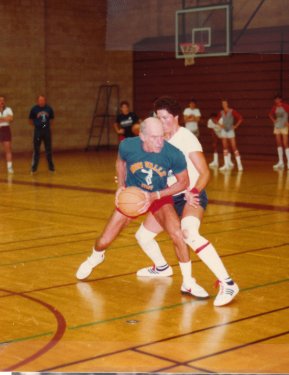
Jack Ramsey teaching at Snow Valley. Photo credit: Steve Middleton
Celebrity Coaches
Over the years Livsey coaxed well-known coaches to spend a week in Santa Barbara, California. In addition to Newell, the list includes Pete Carril, Jud Heathcote, Tim Grgurich, Bill Musselman, Lute Olson, Jack Ramsey, Bill Sharman, and many more. Landing Pete Newell to run the defense for a week of camp demonstrated Livsey’s drive to get the top coaches: A memory he shares with pride. But another memory also sparks satisfaction. Livsey wanted to bring the Van Gundy family to teach defense across all three divisions (Central, 5thto 8thgrade; Eastern, 9thand 10thgrade; Western, 11thand 12thgrade).
The Van Gundy name is woven throughout basketball history. Bill Van Gundy spent over 40 years as a small college basketball coach. In 2005, for his commitment to the game, he was honored by the National Association of Basketball Coaches (NABC) with the Guardian of the Game Award (NABC, 2018). His two sons Jeff and Stan both became NBA head coaches. Between 1995 and 2007, Jeff spent seven seasons leading the New York Knicks and four seasons leading the Houston Rockets. He has served as an NBA Analyst for ESPN since 2007 (USA Basketball, 2018). Stan Van Gundy had three head coaching stints in the NBA with the Miami Heat (2003-06), Orlando Magic (2007-12), and the Detroit Pistons (2014-18) (Basketball Reference, 2018).
The Van Gundy connection to Snow Valley dates back to when Jeff and Stan attended the camp as players. Bill served as a camp coach, keeping a watchful eye on his two young sons. Livsey recalls the moment he decided to bring all three Van Gundy’s in for one week. “I told my wife one day, here is what my goal is,” says Livsey. “Instead of hiring the main coach for the Central Division and lesser-known coaches for the Eastern and Western Division. I am going to try and get the Van Gundy’s to come, with Jeff taking the oldest players, Stan taking the middle players and Bill, the Dad, taking the Central Division. That way I would have consistency across the three divisions.” Livsey met his goal. The Van Gundy’s came for a week.
In retrospect, it may appear that Livsey sought “big names” when hiring lead clinicians. There is some truth to this. But Livsey’s motivation was always driven by finding the best teachers of the game to run the instructional clinics. For every Pete Newell and Van Gundy, many more coaches cut their teeth at Snow Valley before garnering national recognition.
Prior to being named the head coach of the Los Angeles Lakers in 1981, Pat Riley was one of the first professional players to teach at Snow Valley. An All-American player at the University of Kentucky under the legendary Adolph Rupp, Riley led an instructional clinic and shared Rupp’s Guard Around Offense Series. Although not yet a coach, Riley had a knack for teaching and left an impression on Livsey. It’s a moment he still remembers well. “He created an outstanding learning environment during his clinic,” remembers Livsey. “It was a great presentation.”
Riley went on to lead the Lakers to four NBA titles in the 1980s. He won a 5th with the Miami Heat in 2006. Other notable coaches who developed following their experience at Snow Valley included: Dan Hays, who amassed 724 career wins as the head men’s basketball coach at Oklahoma Christian; the late Don Meyer, currently the eighth all-time winningest college men’s basketball coach with 923 career wins; and Tony Harper, one of the winningest high school coaches in Texas with over 1,000 victories. The list goes on.
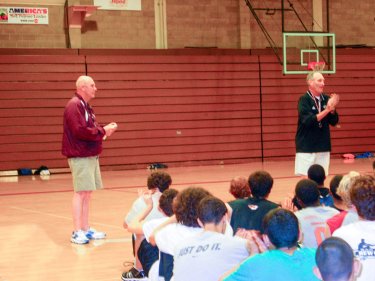
Don Meyer (left) and Dan Hays (right) at Snow Valley. Photo credit: Steve Middleton
Many coaches still work the sidelines. Current Loyola Marymount University head coach, Mike Dunlap won two national championships at NCAA Division II Metro State and spent time as an NBA head coach. Steve Middleton remembers when Pete Newell and Mike Dunlap ran an instructional clinic together. “Pete was in his early 80’s and he was teaching the middle school division, and Mike Dunlap was Pete’s assistant because Pete could not move around really well,” recalls Middleton. “Here is a guy (Dunlap) who won two national championships at the division two level and here is a guy (Newell) who some have referred to as the “Pope of Basketball” in front of these kids.”
Snow Valley became a setting where coaches that cared about teaching the game could converse with each other. A coach would absorb the teaching methods taught at Snow Valley, then implement the concepts in their own program. With an emphasis on improving teaching practice, new basketball ideas advanced.
New Drills for Skills
At 81 years of age, Coach Tates Locke continues to speak at coaching clinics entertaining audiences with his gruff ‘old school’ ire, mixed with a sense of humility and humor. The long-time Snow Valley Coach has deep roots in the game of basketball. It’s a story that includes the hiring of Bob Knight as his assistant coach; a rise to the top of college coaching; an ungraceful exit amid NCAA violations; redemption when hired to revive a struggling program (Rhoden, 1989); and contributions to the game through lessons shared with younger coaches. Locke’s influence on teaching basketball is a series of drills designed to practice the proper footwork associated with the offensive skills of basketball. The drills are called Box Drills. Box Drills originated at Snow Valley, where Locke refined the best approach to teaching the drills.
Charlie Sands was a natural fit at Snow Valley and he left his permanent mark on camp history in more ways than one. Beyond his knack for inspiring campers during daily warm-up sessions, his teaching style focused on the fundamental skills of basketball. Coach Sands’ lasting legacy in teaching basketball is the Oiler Drills. Titled after the nickname of his team at West Los Angeles College, Oiler Drills are conditioning and shooting drills that pushes players to practice at game speed.
While Livsey provided a setting for coaches to advance the teaching of basketball skills through Snow Valley, he made his own direct contributions. Livsey’s friendship with Mark Grabow was well-established: A friendship initiated by Herb after he observed Mark teaching individual skill development in Flagstaff Arizona in 1987. Grabow would spend a couple days at Snow Valley each summer working with the campers. His status elevated due to his role with the Golden State Warriors. He worked out the pros including NBA greats like Chris Mullin, Mitch Richmond and Tim Hardaway.
Influenced by Grabow’s work and with his permission, Livsey created a notebook titled Warrior Drills. Named appropriately for Mark’s role with the Golden State Warriors, the notebook contains 50 pages of drills designed to improve a player’s footwork relative to shooting.
The teaching of Box Drills, Oiler Drills, and Warrior Drills today occurs at every level of basketball in gymnasiums all over the world. Any drill or teaching method developed at Snow Valley was refined through discussions with other coaches at the camp. Coaches working the camp would learn the drills and then share them in their own communities. The more connected the coach was, the greater their influence in spreading and promoting the new way of teaching a skill.
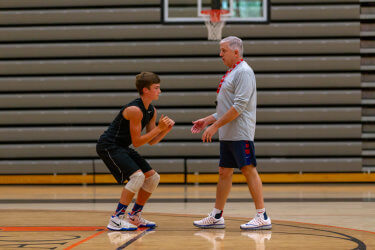
Don Showalter leading instruction at Snow Valley. Photo credit: MD Janiska (https://www.instagram.com/md_janiska/)
A Coach From the Heartland
In 1974 an enthusiastic young coach from Iowa named Don Showalter, eager to see where the sport of basketball could take him, penned a letter to Coach Wooden asking to work as a counselor at one his camps. Showalter remembers being surprised to receive a handwritten letter in the mail from Coach Wooden. Showalter recalls that Wooden’s letter said, “Thank you for your interest. I turned your information over to the guy that runs the camps. If something opens up, I am sure he will be in touch.” That summer when a camp counselor fell ill at the last minute, Showalter received a phone call. For the next 15 years, Don spent his summers working at the John Wooden Basketball Camp.
Showalter credits the letter to Coach Wooden in setting his career path. A journey spanning 42 years as a high school basketball coach in Iowa, where he amassed over 600 wins and was inducted into the Iowa High School Athletic Association (IHSAA) Hall of Fame. In addition, he has served over the past 10 years as the head coach of USA Men’s Basketball U16 and U17 Junior National team. His teams have gone undefeated (62-0) and earned ten-straight gold medals.
Along the way, Showalter grew his network of coaching colleagues. Many of the coaches he met at the John Wooden Camps would impact his personal and professional life. One coach was Wayne Carlson. “Don and I worked the John Wooden camp together in the late ’70s and I told Herb, I worked with this great coach from Iowa,” says Carlson. “I would talk to Don and say you need to come out and work Snow Valley, it is totally different than the Wooden camp. I mean you are not around John Wooden every day – but it’s a great teaching camp.” Showalter did not need much persuading.
Don Showalter built a coaching career on his ability to teach the fundamentals of basketball and make connections with those in the game: Both of which were nurtured at Snow Valley. He shared the same passion for teaching basketball as Herb Livsey and he would play a key role in carrying on Snow Valley legacy. Showalter also help spread some of the teaching ideas developed at Snow Valley. One was Cutthroat.
Cutthroat
Cutthroat is a 4 on 4 live scrimmage situation involving four offensive and four defensive players. Coaches can modify the rules to adapt the game to their coaching philosophy. For example, each of the four offensive players must touch the ball before a player can shoot, a player must recognize a good pass from one of their teammates when they score, or an offensive player can only take two dribbles.
Cutthroat can be used to develop both offensive and defensive skills. However, it originated as a method to teach defense in 1975 when Livsey asked Dick Motta of the Chicago Bulls to teach the defense at Snow Valley. Coach Motta spent 25 seasons as an NBA head coach. In 1971 he was named NBA Coach of the Year and in 1978 won an NBA Championship with the Washington Bullets. He ranks among the all-time leaders in NBA games won and number of games coached (NBCA, 2018). “He (Motta) says to me, ‘I could teach defense any way you want. But when I coach, I teach it through Cutthroat. I call it Cutthroat,’” said Livsey. “I set it up and we ran Cutthroat the first night and Snow Valley adopted Cutthroat as the centerpiece of the defense.” Cutthroat continues to be a central part of a Snow Valley basketball camp. Today, coaches implement Cutthroat at all levels of play from youth leagues to the NBA.
Showalter embraced cutthroat as a teaching tool and a method of helping players come together as a team. He first implemented the game with his high school team and then with the USA Junior National Team. “Kids love it. We are talking high-level types of players really buying into cutthroat. It is fun but at the same time really intense,” says Showalter. “We were teaching a lot of things with it. It evolved (from Snow Valley) to our national team.”
Showalter’s success with the USA Junior National Team is credited to his ability to communicate with elite athletes and build an effective team culture. Livsey once asked Showalter how he got the young stars, the elite U16-U17 athletes on the Junior National Team, to play together. “He looks me in the eye,” Livsey recalls, “and says Cutthroat.”
Cutthroat, like the Box Drills, Oiler Drills, and Warrior Drills were cutting edge techniques that kept coaches coming back to Snow Valley each year. In addition, coaches recognized the value of making connections with other coaches at Snow Valley in regard to career advancement.
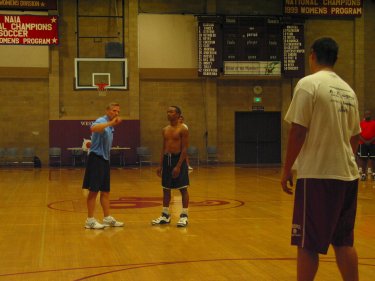
Mike Dunlap teaching at Snow Valley. Photo credit: Steve Middleton
It’s Who You Know…
Beyond improving teaching competence, Snow Valley served as a place a coach could meet the right person and maybe secure a job. “If someone was looking for an assistant, they might say, ‘Hey, go call Herb,’” remembers Steve Middleton. “That was the reason a lot of guys would come to work the camp in the early days. There are so many guys that owe their job to Herb Livsey and Snow Valley.”
Richard Fujii felt the impact of Herb’s influence in securing an assistant coaching position at Menlo College (CA). One summer at Snow Valley, Fujii served as a basket coach during a post clinic led by Kaniela Aiona. Aiona and Fujii had a conversation, but that was the extent of their interaction. A few years later Aiona became the Head Men’s Basketball Coach at Menlo College. After his first season, Aiona had an assistant coaching position open. Because Fujii had met Aiona at Snow Valley he reached out to Aiona to inquire about the opportunity. Unknown to Fujii, Livsey was a mentor to Aiona.
Around the same time, Livsey and Fujii were both attending a wedding for a Snow Valley coach. Serving as a groomsman, Fujii spoke about how he met the groom at Snow Valley and the passion they both had for the camp. Following the speech, Livsey approached Fujii. Chuckling at the memory Fujii recalls Livsey saying, “Fujii I have been at a lot of weddings and this is the first time Snow Valley has been mentioned in a wedding.” The conversation continued and Fujii shared that he had been in contact with the head coach at Menlo College about an opening on his staff. Fujii remembers Livsey’s response, “Herb says, ‘oh yeah, Kaniela is up there. I mentored him,’” says Fujii. “Herb makes a phone call and two days later I get a call from Kaniela.”
Outside of Livsey’s direct influence on career advancement, the camaraderie shared among Snow Valley coaches opened potential career pathways. To work a Snow Valley camp was a shared experience, an initiation into the Snow Valley coaching fraternity. Steve Middleton reflected on his experience – stating, “when you worked Snow Valley, at the end of the week you were exhausted. Coaches having gone through that together, hold that…‘we were worked to the bone’ to our hearts.”
Pete Gaskill remembers his induction into the Snow Valley coaching fraternity. “At first I was the new guy, then I was the guy from Iowa, and then I was the guy from Kansas City, and then I was Pete Gaskill,” shared Pete. “They (coaches at Snow Valley) look out for you. I had so many people look out for me. So anytime I go out there I try to make sure I help others the same way.”
A network was established. Over the years, a Snow Valley coach would hire coaches they worked with or take recommendations from other Snow Valley coaches they knew. Coaches had access to knowledge, job opportunities, and more importantly, they became a part of each other’s lives. An extended family.
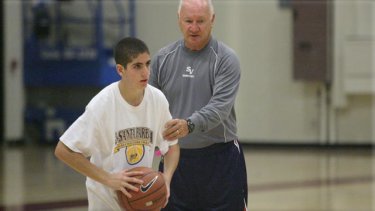
Charlie Sands leading instruction. Photo Credit: US Sports Camps.
The Snow Valley Family
Summer vacation for the Carlson family included a three-week stay at Westmont College. They lived in the dormitories. The kids attended the camp. Wayne’s spouse assisted in the camp office. “For me it was a family thing – going up there for 3 weeks during the summer for 34 years,” Wayne reminisces. “The support was amazing. You had guys you would get together with as the years went on who you’d talk with and share things.”
Clete Adelman echoed Carlson’s sentiment. “The life-long friends that you make continue your education,” shared Clete. “I could not have stayed in coaching if it was not for Snow Valley. I don’t think I would have been nearly as effective.” As the fraternity continued to grow, connections between coaches included their families. Especially when coaches worked together year after year. Which was the case with Clete Adelman and Charlie Sands.
Ten-year-old Ben Adelman started following his father to Snow Valley. Eventually, working as a counselor and then a coach. Due to his Dad’s role as a camp administrator and the amount of time he spent at camp, Ben became close to Charlie Sands and was a recipient of many of his life lessons. Often the lessons positioned around being a good teammate. Clete Adelman fondly recalls one of Sands’ lessons about being a positive contributor to the team. “One of his (Sands) comments was, don’t be that guy. Don’t be the guy who is the negative part of the team. Who is not contributing anything unless you are involved,” remembers Adelman. “Sometimes Sands would look at the kids and he would say, ‘Are you that guy?’ The kids would look at him and the kids would get it.”
In 2001 Livsey stepped away from Snow Valley after 41 years, selling his ownership rights to US Sports Camps. Sands already a part-owner retained his rights. Together, with the assistance of Adelman, Carlson, and Middleton they kept “The Snow Valley Way” intact. But in 2015, Charlie Sands was no longer himself. Ill from the effects of corticobasal degeneration(CBD), a rare progressive neurological disorder that leads to cell loss and deterioration of specific areas of the brain, Sands could no longer coach at Snow Valley.
Realizing Sands’ decline was happening swiftly, Ben Adelman found an old picture of Charlie Sands doing push-ups in front of the campers. In honor of Coach Sands, Ben had t-shirts made with the picture and the phrase, Be this Guy! “Charlie was special…,” Clete stated, trailing off – emotional at the thought of his friend. “He (Ben) just loved Snow Valley and Ben loved Charlie.”
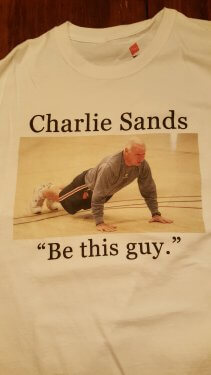
Ben Adelman’s T-Shirt of Charlie Sands. Photo credit: Clete Adelman
“When we took the t-shirts back to the camp, the guys just went nuts,” says Clete. “We gave them to his family. But then there was such a demand for them that we had to order some more.”
Although Charlie was unable to work camp, he attended all week. The camp staff organized a luncheon as a tribute to the esteemed coach. As the story goes, Ben assists Coach Sands as they amble towards the cafeteria. At one point Ben reveals he is wearing the t-shirt. Sands, not one to hold back his feelings, shares a personal, emotional minute with Ben. A powerful moment only to be matched by what awaited them in the cafeteria. As Charlie and Ben enter the lunchroom, the entire camp staff stands up. Clad in the t-shirt Ben made, many in tears, they saluted Charlie.
Sands passed away in 2016, leaving behind the legacy of a teacher who truly cared. To those that knew him, Sands epitomized a Snow Valley coach. A coach that set a higher standard, was open to learning, and always strived to make a difference. A person willing to give and receive in a supportive community.
By the early 1990s the Snow Valley name echoed throughout the basketball landscape. A basketball school had changed the game and connected hundreds of coaches. Charmed by the Snow Valley Way of teaching and connections he made, Don Showalter and his good coaching friend from Iowa, Jerry Slykhuis, were ready to help grow the Snow Valley Way.
References
Basketball reference (2018). Stan Van Gundy. Retrieved from https://www.basketball-reference.com/coaches/vangust99c.html
Citizen Naismith Trophy (2018). Past award winners. Retrieved from http://naismithtrophy.com/awards/
NABC (2018). NABC Guardians of the game awards. Retrieved from: http://www.nabc.com/awards/guardians_of_the_game
Naismith Memorial Basketball Hall of Fame (2018). Peter F. “Pete” Newell. Retrieved from: http://www.hoophall.com/hall-of-famers/pete-newell/
NBCA (2018). Dick Motta consideration into Naismith Basketball Hall of Fame. Retrieved from: https://nbacoaches.com/dick-motta/
Rhoden, W. C. (1989, November 8). A new leaf for Tates Locke; Indiana State hopes he’ll revivify the basketball program. New York Times. Retrieved from: https://www.nytimes.com/1989/11/08/sports/new-leaf-for-tates-locke-indiana-state-hopes-he-ll-revivify-basketball-program.html
USA Basketball (2018). Jeff Van Gundy. Retrieved from: https://www.usab.com/basketball/staff/v/van-gundy-jeff.aspx
Chapter 4
Mountains to Cornfields
Herb Livsey has a lot to be proud of when it comes to Snow Valley. Herb was responsible for establishing a tradition of teaching excellence at the basketball school: A way of teaching that would forever change the way basketball is taught. “We would not go against the basic fundamentals. You would never hear that at Snow Valley we taught something outlandish or different,” said Livsey. “We would teach fundamental basketball. The skills have never changed. To this day, you still have to be able to pass, dribble, shoot, defend, understand team defense and rebound the ball.”

Herb Livsey (yellow shirt). Photo credit: Steve Middleton
After Livsey left the camp in 2001, he was still involved. “He would see a guy teach and call me up and say you need to hire this guy for Snow Valley,” recalls Wayne Carlson. “He did that until 2016. So the school was still very much a part of him and he wanted it to succeed and do well.”
During Livsey’s 40-year Snow Valley journey, there were many contributors. The first was Chuck Walker. Walker and Livsey met at Winnemucca High School in Nevada. Both teachers at the school, Herb was the basketball coach and Chuck was the football coach. Each served as the other’s assistant. When Herb decided to start Snow Valley, Chuck agreed to become a partner in running the camp. Walker helped Livsey in all aspects of the camp; from painting court lines on parking lots to building bleachers and backboards, to the daily operation of the camp. In addition, Walker became a mentor to many coaches that worked Snow Valley over the years.
Livsey and Walker complimented each other well. In a short time, both men moved on from Winnemucca. Livsey went on to Costa Mesa High School (CA) and Walker enrolled at the University of Utah to pursue a Ph.D. They continued to operate Snow Valley each summer. Walker would eventually land at Fort Lewis College in Colorado, serving as a member of the faculty for 31 years. Walker left Snow Valley in 1984.
In addition to Walker, Livsey is quick to credit other coaches who made contributions to Snow Valley. Stan Morrison was one of these. Morrison built a hall of fame career in collegiate athletics in the state of California. First as a student-athlete at the University of California, where he played center under Pete Newell; then as a collegiate coach and athletic administrator for over 45 years (California Sports Hall of Fame, 2018). Morrison started working Snow Valley during his brief stint as a high school coach in the mid-1960’s. A great teacher, his specialty was post play.
Livsey recalls, “Stan and I would get the big kids up in the morning and we went to the courts before breakfast to work on post moves. That was the birth of going early every day before breakfast.” The early-bird session became a staple of the Snow Valley Way. A concept, like others that evolved over the years. An approach established because Livsey was open to new ideas and willing to learn from the coaches he brought to teach, especially when he thought it would improve the learning environment.
Morrison is one in a long list of contributors: Too many to mention. Hundreds of coaches, each uniquely enriching the learning environment at Snow Valley – helping Livsey establish a tradition of teaching excellence.
Mountains to Corn Fields
Already spending his summers in California, Don Showalter convinced his coaching colleague in Iowa and good friend, Jerry Slykhuis to join him at Snow Valley in Santa Barbara. A long serving biology teacher and coach at Cedar Falls High School in Iowa, Jerry Slykhuis was known as a student of the game. His scholarly approach may have developed out of necessity. His athletic career focused on football. Jerry never set out to be a basketball coach. But as a young teacher and assistant football coach at Fort Madison, Iowa in the late 1960’s, the basketball team needed a coach and Slykhuis accepted.
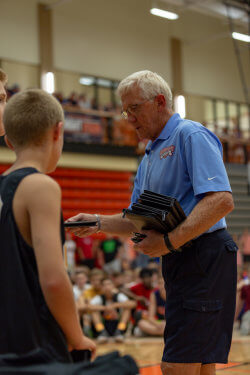
Coach Jerry Slykhuis. Photo Credit MD Janiska
After a few years at Fort Madison, Coach Slykhuis took a position at Iowa’s Cedar Falls High School. A patient teacher, Slykhuis cherished the learning process. He role-modeled and demanded a strong work ethic. A competitive spirit highlighted his fiery side. At the same time, he could connect with kids. “He is really good with kids,” says Don Showalter. “I always felt his greatest asset is he could always read people really well.” Coach Slykhuis won 531 contests in 39 years as a high school basketball coach. In 2009, the Iowa High School Athletic Association inducted him into the Hall of Fame (Aguirre, 2016).
By the early 1990s the Snow Valley Basketball School was well-established as a leader of basketball instruction in the United States. The Snow Valley Way was firmly entrenched as the premier method to teach basketball skills. But by now the basketball camp environment was changing. “At that time everything was going to team camps. Colleges had team camps. High Schools went to team camps,” shared Showalter. “So there was really not as much teaching the game as there was playing.” Showalter and Slykhuis felt that there was a real niche for a camp like Snow Valley in Iowa.
In 1994, Showalter and Slykhuis with Herb’s blessing and assistance operated the first Snow Valley Iowa Basketball School. “He (Herb) was an amazing help. He came out to camp and did some clinics,” recalls Showalter.“I think he was kind of proud of the fact that we wanted to start a camp that he had originally initiated.”

Don Showalter – Snow Valley Iowa. Photo Credit MD Janiska
Snow Valley Iowa
The first year, Snow Valley Iowa enrolled 80 kids for one week and hired 9 coaches. Today, at Wartburg College, enrollment ranges from 1300 to 1500 participants across four sessions with 40 to 50 coaches working a session. Using the blueprint Livsey created, Showalter and Slykhuis made only minor changes to the schedule – mainly to maximize facility space. Otherwise, the organization of the camp remained very similar to the camp in California.
For the instructional clinics, this meant securing some of the top teachers of the game. These included Tates Locke and Mike Dunlap, long-serving Snow Valley coaches from California; Rod Baker and Dave Bollwinkel, veterans of the collegiate ranks and NBA scouts; Mike Procopio, Dave Severns, and Tom Sterner, elite player development specialists; and the best local high school and collegiate coaches, mostly young coaches who were hired under the premise they would develop. In recent years, an influx of coaches with international playing and coaching experience has served on staff. “We hired coaches who could take direction,” states Showalter. “Could they watch somebody else present a clinic and then teach the way the lead clinician was teaching the kids at their basket?”
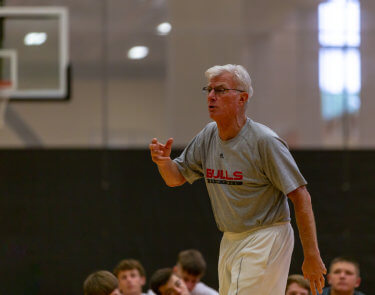
NBA Scout and Snow Valley Coach Dave Bollwinkel. Photo Credit MD Janiska
Showalter and Slykhuis surrounded themselves with a trusted few to help administer the camp. A loyal contingent of great teachers including Chris Kern, Showalter’s long-time assistant coach a Mid-Prairie High School (IA); Dave Schlabaugh, the head men’s basketball coach at Cornell College (IA), who also assisted Showalter at Mid-Prairie; Dick Peth, the head men’s basketball coach at Wartburg College (IA); and Ken Spielbauer, the long-time head coach at Wapello High School (IA). The camp administrators, whether in California or Iowa operated like guardians of the game. Protecting the quality of instruction, while helping to expand the teaching of basketball fundamentals.
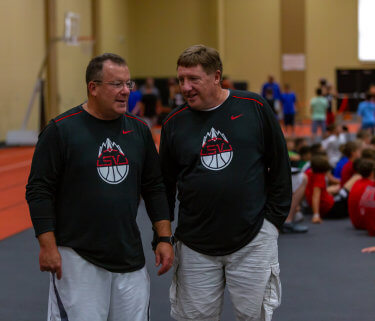
Camp Administrators Chris Kern and Ken Spielbauer. Photo Credit MD Janiska
Livsey’s influence was evident, but Showalter and Slykhuis put their own stamp on the camp. For example, Slykhuis was working another basketball camp in Iowa when a game caught his attention. Excited to bring the idea to Snow Valley Iowa, Slykhuis made a few adjustments and introduced the game. He named it Survivor. Survivor involves continuous action that starts with a 5 on 5 scrimmage situation eventually crowning an individual winner. It quickly became a camp favorite and is played the final evening of camp. With the introduction of Snow Valley Iowa the Snow Valley Way grew. Offering more opportunities for young athletes and impacting a new generation of coaches.
The Next Generation
Charged to lead a series of instructional clinics, Jason Kern’s energy complements his teaching ability. At 29, Kern is the head boys’ basketball coach at West Branch High School east of Iowa City. He grew up at Snow Valley Iowa. His father Chris Kern a long time Snow Valley Iowa camp coach would bring him and his brother along each summer. Jason signed on to work Snow Valley straight out of high school. His approach to coaching illustrates the influence Snow Valley can have on a young coach and he recognizes the impact.
“There is just a wealth of knowledge here. There are people as young as me giving lead clinics. Then there are people like Coach Showalter giving lead clinics,” states Kern. “You can learn from everybody here. It’s a great place to talk to coaches that are successful and see what they do.”
Kern is part of a new generation of coaches influenced by the Snow Valley Way. A distinction he shares with Caleb Lewis.
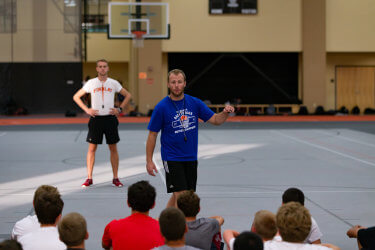
Jason Kern leading an instructional clinic. Photo Credit MD Janiska
Lewis, the head boys’ basketball coach at English Valley High School in Iowa, heard working Snow Valley was tough. Long days and high coaching expectations. “I came in as a junior high coach with a lot of playing experience but not a lot of coaching experience,” states Lewis. “I had just as much energy and passion as anybody and I felt like I had to use that and go with it.” Caleb’s passion and energy caught the attention of camp administrators and he began to get more opportunities. Over two sessions this past summer he was in charge of ten instructional clinics.
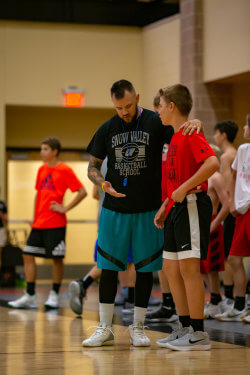
Caleb Lewis instructing a Snow Valley camper. Photo Credit MD Janiska
Lewis and Kern are recipients of a culture where younger coaches can thrive and learn from established coaches. They can share ideas and receive feedback while honoring the customs and practices of the camp handed down by veteran coaches.
After 16 years of working the camp, Jacob Brindle finds himself becoming the veteran coach, the one to impart wisdom on the younger coaches working Snow Valley for the first time. The head boys’ basketball coach at Cascade High School in Cascade, Iowa, Brindle led the Cougars to a 2A state championship in 2018. He has spent his entire career at Cascade High School, starting as an assistant coach before moving into the head coaching role. He credits working Snow Valley each summer in advancing his skills as a teacher of the game. “That first year I was just overwhelmed,” said Brindle. “Then each summer you come back. You get into it and you start reflecting as a coach.” He now tells young coaches it’s okay to learn and ask questions. “Coaches are eager to share,” says Brindle. “We are all just trying to get better.”
Matt King recently completed his 7th summer working Snow Valley Iowa. A natural fit, he quickly embraced the Snow Valley Way and in a few short years was elevated to director of the Eastern Division. King quickly recognized how Snow Valley influenced coaches beyond basketball. “If there’s anything I have learned from Snow Valley, it’s how to treat people,” shares King. “No person is more important than anybody else. A youth coach has the ability to interact with an NBA coach across the four days of camp. There are no lines in the sand at Snow Valley.”
King found success as a high school coach in Arizona and today serves as the Executive Director of the Arizona Basketball Coaches Association. He is part of a new generation of leaders at Snow Valley, and like his predecessors, ready to protect and grow the game of basketball for decades to come.
King, along with Brindle, Kern, and Lewis represent what Showalter refers to as “Snow Valley Guys.” A coach who buys into the Snow Valley Way and desires to share it with others. A leader of young people. A teacher of skills. A coach committed to making a difference in the way they teach the game and willing to work hard to get better. More importantly, they each give as much as they receive, helping to create a community of coaches that learn and support each other.
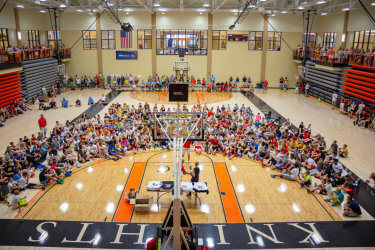
Snow Valley Iowa. Photo Credit MD Janiska
A Supportive Community
Stephen Carter needed to get back to the courts for the camp staff meeting. He maneuvered Jerry Slykhuis’ car with caution, weaving among the crowd of parents and kids. Slykhuis had let him borrow the car to run an errand. It was the first day of camp. A feverish couple of hours. Parents asking questions. Kids navigating dorms and finding their way. Hugs and goodbyes. A few campers apprehensive at the sight of their parents departing and possibly their first time away from home. Older, experienced campers eagerly waving goodbye, excited for a week with their friends.
Carter glanced around for an open parking spot. Nothing. Then jackpot! The perfect spot appeared. He parked the car and never gave it another thought. Later that day, Slykhuis found Carter. He produced a picture on his phone showing his car sitting in a no parking zone. A parking ticket peeking out from the windshield. Slykhuis razzed Carter the rest of the week. He also refused Carter’s pleas to pay the ticket. That was Jerry. Both actions, demonstrating the man many knew him to be.
“Guys like that (Jerry) are why we (coaches) come,” shared Carter. “The people you meet. How things are done. It sets a standard for everybody.” The camaraderie, the shared experience, and the bonds that form create a culture where coaches feel supported. Snow Valley Iowa coach John Walz was another recipient of that support. A high school coach in Northwestern Iowa and a father of three, Walz lost his wife to cancer in 2015. “Some of the first people that reached out to me were Snow Valley coaches,” said Walz, “When we had my wife’s funeral, we had a great showing of coaches from Snow Valley, some driving as many as five hours to get there.”
The support system of Snow Valley coaches would be tested when tragedy struck in December of 2016. Jerry Slykhuis and his wife Jane were traveling a rural highway, Route 56 in Western Kansas. A semi-trailer truck ran a stop sign. Both were instantly killed. The news rocked the Snow Valley community. A mentor, friend, and teacher had been suddenly taken.
When coaches have convened in Iowa the past two summers for camp, memories of Coach Slykhuis are a part of many conversations. Slykhuis had a way with people. He touched countless lives and left a lasting impact on many Snow Valley coaches. Considered a cornerstone of this supportive environment, Slykhuis was a part of a community that could lift a coach up when down. A place where coaches could go to love the game again.

Wartburg College Gym home of Snow Valley Iowa. Photo Credit MD Janiska
Where Coaches Go to Love the Game Again
Steve Middleton was busy balancing the life of a teacher and coach, with a young family. The atmosphere surrounding his coaching role with his athletic director had become uncomfortable, eventually forcing Middleton to step away from his coaching role. But he kept coming back to Snow Valley California each summer. “Snow Valley is what kept me in coaching during that time. That became my outlet,” recalls Middleton. “I was around the game’s finest and they valued me and made me feel that I did a good job teaching and coaching. I belonged with them.”
Livsey was known to pick up the phone when a Snow Valley coach was fired, to check on them and make sure they would be at camp that summer. For the coach, Snow Valley became more than a place where a coach became better through instructional clinics, the standard of teaching excellence or connecting with a vast network of coaches. It became a net to catch you when you were falling.
Brandon Henderson had just resigned from his head coaching position. He remembers it feeling like the lowest point in his coaching career. Then a friend, a Snow Valley Coach, encouraged him to work Snow Valley Iowa with him that coming summer. Henderson, already a Snow Valley veteran, attended Snow Valley California as a camper and then with the assistance of his prep coach started working the camp. For ten years he developed strong ties with other coaches. Henderson agreed to his friend’s request. He had always felt support from the Snow Valley community, but when he really needed it, they came through.
“I was working as a basket coach in Iowa and Matt King came up to me and told me to keep fighting and get back into coaching,” recalls Henderson. “Having him go out of his way for me, is an example of the type of support Snow Valley provides for coaches. A place for coaches to get back on their feet after a rough season.” For Henderson, Snow Valley holds a special place in his heart, a community of coaches that helped him rekindle his love of the game.
“It’s like a rehabilitation center for coaches,” says Matt King. “Snow Valley reinvigorates your love of the game because it is so pure here. All that negative stuff that is often talked about in youth basketball. It’s just not here…at all. This is a place to come love basketball again.”
Middleton and Henderson both discovered that Snow Valley was a place where coaches could go to refresh their passion for the game. To remember why they coach. All coaches who worked Snow Valley and those that kept coming back wanted to be a part of an environment Herb Livsey so passionately created in the 1960s. A setting that offered the coach what they needed. A place to grow, to connect, and gain support. And it’s a legacy that continues today.
The Legacy Continues
Stephen Carter looks like the conductor of the college pep band on game day. Barking orders, dancing around the court, getting the group to play with passion. But Carter’s charge is not to fire up spectators with school spirit, but to follow the lead of his mentor Jerry Slykhuis and instruct campers in the daily warm-up. It’s a role that Slykhuis did with so much heart and energy in Iowa, just as Charlie Sands did in California. And Carter is the perfect fit. His enthusiasm is pure. He cares about the kids. He can relate.
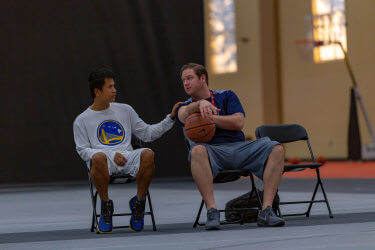
Stephen Carter (right). Photo Credit MD Janiska
Currently an assistant women’s basketball coach at Belmont Abby College, Carter admits his coaching style is a work in progress. But he knows what he believes in and is driven by what he overcame to be at Snow Valley in front of these kids. Life experiences that challenged him, shaped him and gave him the gift of empathy – an understanding of what a coach’s role is in leading young people. These are traits nurtured in the Snow Valley community. Carter found his niche leading the camp warm-up, a way to continue the legacy of those before him. Others contribute in a different manner.
After working a number of sessions each summer at Snow Valley Iowa, Cam Schuknecht and Mark Franzen were interested in starting a Snow Valley Basketball School. In 2004, Franzen was named the head men’s basketball coach at Nebraska Wesleyan University (NWU). He hired Cam Schuknecht as his assistant coach. Already established as Snow Valley Guys, they received approval from Showalter and Slykhuis to begin Snow Valley at Nebraska Wesleyan in the summer of 2005. The camp became a satellite camp of Snow Valley Iowa.
“We would work with Showalter and Slykhuis hand-in-hand on running the camp. We talked with Showalter frequently regarding the administration and details of running the camp,” says Schuknecht. “Participation numbers were strong, and we were able to attract quality staff.” Franzen left in 2006 to lead the Luther College Men’s program. Schuknecht assumed the reigns of the NWU program and continued the camp. Snow Valley at Nebraska Wesleyan ran nine summers over ten years. Beyond Snow Valley at Nebraska Wesleyan, other spin-offs from Snow Valley Iowa include Snow Valley Colorado and Snow Valley Missouri.
In the early years of Snow Valley, Livsey also ran satellite camps. In the 1970s, with the help of Snow Valley coaches, Livsey took Snow Valley to Hawaii. The Vulcan Camps, with a Snow Valley structure, still operate today at the University of Hawaii-Hilo (O’Rear, 2017). For a number of years, Livsey would take coaches up to Sitka, Alaska and run “Snow Valley North” over the Labor Day weekend. Two Snow Valley California coaches, Kenny Hoffpauir and Barry Boren founded the Texas Preps Basketball School in 2003. Each spin-off contributes to the Snow Valley legacy in teaching the fundamentals of basketball.
Livsey’s legacy is carried on by each of the coaches that worked Snow Valley over the years. But for Livsey, Don Showalter has perhaps been the perfect ambassador to impart the Snow Valley Way on future generations of coaches through Snow Valley Iowa. Livsey enhanced Showalter’s career as a mentor, exposing him to new ways of teaching and connections to a greater basketball community. Today, coaches working Snow Valley Iowa hold Showalter in high regard. They want to please him. His mere presence brings a higher standard. It’s a similar stature a coach held towards Livsey for 40 years in California. Showalter’s passion for teaching the fundamentals of basketball, his commitment to developing the coaches that teach the game, and his connections around the globe have positioned him to carry on the legacy of Snow Valley.
As Snow Valley Iowa enters its 27th year, the Snow Valley Basketball School in Santa Barbara nears its 60–year anniversary in 2021. Today the camp is owned by US Sports Camps.
Hall of Fame
The Naismith Memorial Basketball Hall of Fame in Springfield, Massachusetts is home to 104 coaches. A few of them spent time at Westmont College each summer and many more implemented Snow Valley concepts as teachers of the game. The Hall of Fame also honors 71 contributors to the sport. Familiar names include Dick Vitale, the enthusiastic basketball analyst; George Raveling, retired coach and long-serving ambassador of the game; and the late Tex Winter, the architect of the triangle offense that produced nine NBA championships (Naismith Memorial Basketball Hall of Fame, 2018).
In time, Herb Livsey may join them. As a life-long educator, he changed the game of basketball. He followed his passion early in life. He believed in teaching fundamental basketball skills and through the Snow Valley Basketball School influenced how generations of coaches taught the game.
——–
References
Aguirre, J. (2016, December 21). Iowa High School Hall of Fame basketball coach, wife die in car crash.Des Moines Register. Retrieved from: https://www.desmoinesregister.com/story/sports/high-school/2016/12/21/iowa-high-school-hall-fame-basketball-coach-wife-die-car-crash/95695298/http://californiasportshalloffame.org/inductees/stan-morrison/
California Sports Hall of Fame (2018). Stan Morrison. Retrieved: http://californiasportshalloffame.org/inductees/stan-morrison/
Naismith Memorial Basketball Hall of Fame (2018). Hall of famers. Retrieved from: http://www.hoophall.com/hall-of-famers/
O’Rear, B. (2017, June 4). Basketball: Vulcan Camp goes old school. Retrieved from: https://www.hawaiitribune-herald.com/2017/06/04/sports/basketball-vulcan-camp-goes-old-school/
Author Note
This story could not have been written without the thoughtful contributions of Snow Valley coaches that worked at the basketball school over the years. Although many of them were mentioned throughout the 4-part series, many more contributed. Each providing insight on the importance of Snow Valley in their development as a coach. I hope the story captures the essence of what coaches gained from working Snow Valley and provides insight to others on the importance of finding a supportive learning environment for personal and professional growth.

Pete
Fabulous article on Herb and Snow Valley. You captured all the magic. I was on the staff from 1984 through 1999. I forwarded this article to Pete Newell Jr. and Pete Vaz Also on the staff.
Thanks for highlighting the people and characteristics of the school.
Thank you for your kind words, Coach! Glad to hear you enjoyed it. It was a lot of fun to dive into the history of Snow Valley.